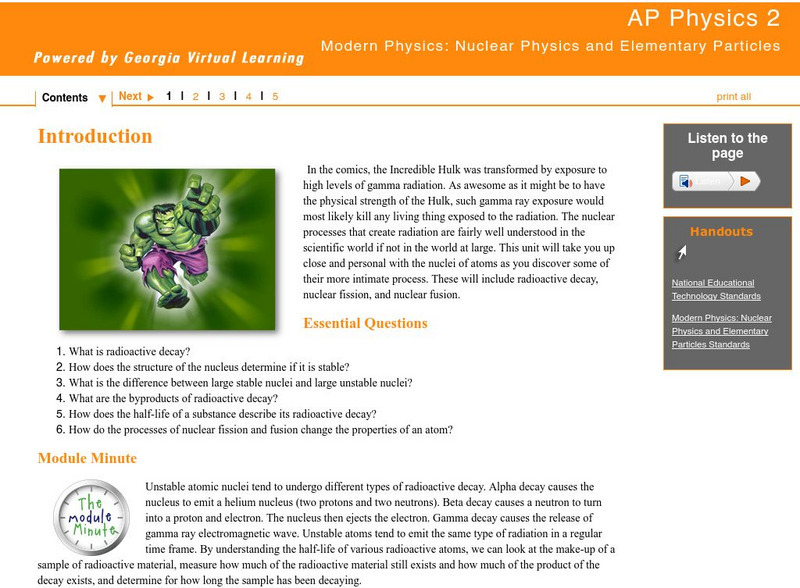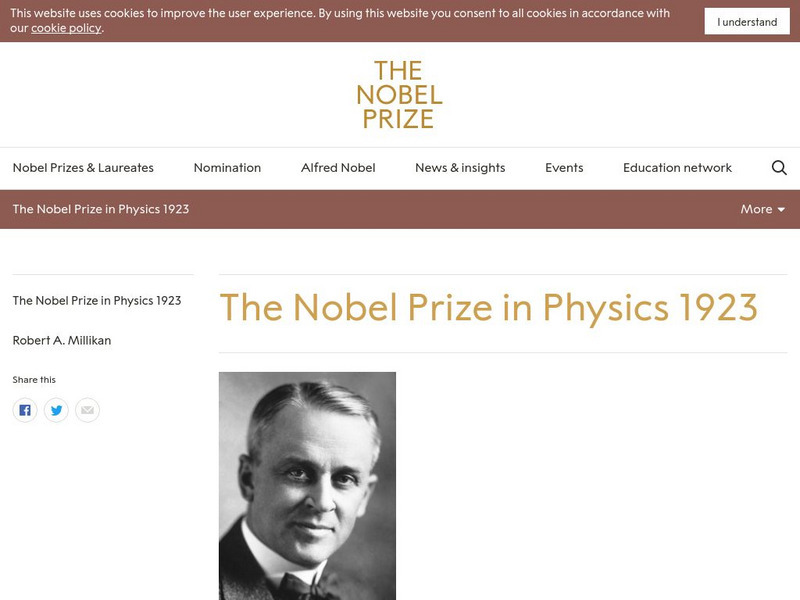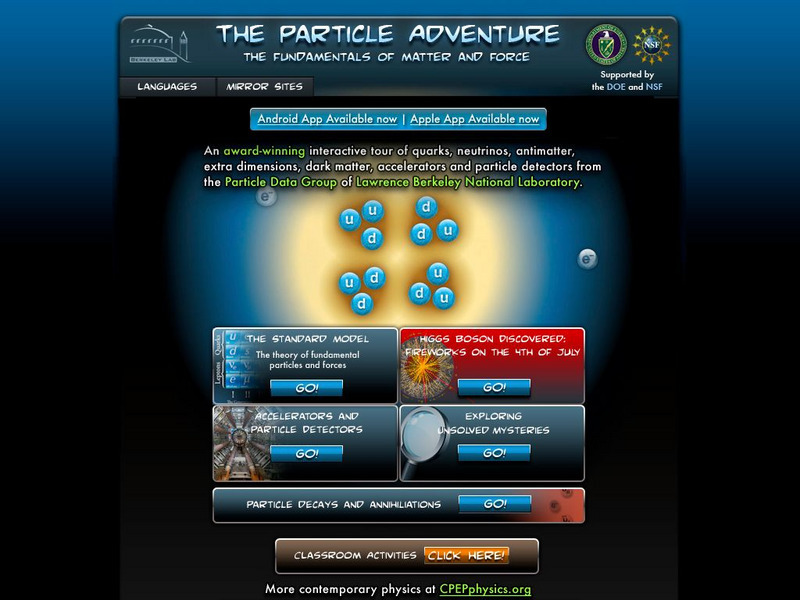Ducksters
Ducksters: Science for Kids: The Atom
Kids learn more about the science of the atom. Electrons, neutrons, and protons make up the smallest bits of matter.
ClassFlow
Class Flow: Element Math
[Free Registration/Login Required] In this flipchart students determine the number of protons, neutrons, and electrons of elements essential to life. They use Activotes to check knowledge gained. Students create a Bohr Model.
Science Struck
Science Struck: What Makes Up an Atom?
Describes the structure of an atom and the characteristics of the electrons, neutrons, and protons inside it. Includes some interesting facts about atoms.
Mocomi & Anibrain Digital Technologies
Mocomi: Structure of an Atom
An atom is made of three parts - protons, neutrons, and electrons. Here you can explore these different parts.
Quia
Quia: Mr. Snyder's Game of Atomic Terms
A short matching quiz on basic terminology related to atomic structure. Answers provided.
University of Colorado
University of Colorado: Ph Et Interactive Simulations: University of Colorado: Build and Atom
Build an atom out of protons, neutrons, and electrons, and see how the element, charge, and mass change. Then play a game to test how the ideas work!
University of Colorado
University of Colorado: Ph Et Interactive Simulations: Build an Atom
Build an atom out of protons, neutrons, and electrons, and see how the element, charge, and mass change. Then play a game to test your ideas!
Khan Academy
Khan Academy: Biology: Water, Acids, and Bases: Acids, Bases, P H, and Buffers
Learn the basics of acids, bases, proton concentration, the pH scale, and buffers in this article.
Chemistry Collective
Chem Collective: Determining the P Ka and Concentration Ratio
Use the virtual lab to determine the pKa of a protein then create a buffer solution with a specific concentration ratio of the protein in its protonated/ unprotonated form.
Utah Education Network
Uen: Atomic Model Construction
Students create models of atoms then compare the various aspects of the atoms including; relative size, charge, positions of subatomic particles, and identity of the atom based on proton, neutron, and electrons with the class.
Fun Brain
Fun Brain: Proton Don (Periodic Table Game)
Play by matching an element's name to its symbol or supply the missing name for an element when presented with its symbol. Includes a tutorial so that you can review the symbols for elements before you play.
Other
Particle Physics at Discovery's Horizon
Explore the Large Hadron Collider (LHC) and how the U.S. Department of Energy and National Science Foundation have collaborated with this huge project and related experiments. You can find facts about the LHC, browse a bank of high...
Other
Fermilab: Hyperons & Neutrinos
The third paragraph pinpoints the importance of hyperons in particle research. Hyperons and neutrinos share characteristics of the weak force. Complex stuff, but the real deal. Parts of this report may be very useful. Many photos, slow...
American Chemical Society
Middle School Chemistry: Periodic Table
Students explore the periodic table and learn the basic information given for elements: the name, symbol, atomic number, and atomic mass for each element.
PBS
Pbs: People & Discoveries: Ernest Rutherford
A lovely biographical piece about Ernest Rutherford. A number of personal notes, along with extensive information about the physics work he did. Nice quote at the end.
CK-12 Foundation
Ck 12: Structure of the Atom
[Free Registration/Login may be required to access all resource tools.] Students learn about the important discoveries of subatomic particles, and how they led to our current understanding of the atom.
Georgia Department of Education
Ga Virtual Learning: Nuclear Physics and Elementary Particles
This interactive unit will take students up close and personal with the nuclei of atoms as they discover some of their more intimate process. These will include radioactive decay, nuclear fission, and nuclear fusion.
Nobel Media AB
The Nobel Prize: The Nobel Prize in Physics 1923: Robert Andrews Millikan
This Nobel website on the life and scientific work of Robert A. Millikan includes a biography, images, and internet resources for further reading and research. Also included are the 1923 "Presentation Speech" which praised Millikan's...
Annenberg Foundation
Annenberg Learner: Interactives: The Periodic Table
An interactive website where students learn about the basics of an atom, periodic tables organization, and the structure and properties of matter. Module includes an introduction and five lessons that are followed by a quiz and an...
Annenberg Foundation
Annenberg Learner: Interactive Periodic Table of the Elements
A fun way to learn about the periodic table! This interactive table allows students to investigate the basic information of an element as well as explore group and family characteristics.
Concord Consortium
Concord Consortium: Stem Resources: Atomic Structure
Introduces learners to atomic models of the past and present, focusing on the orbital model and an explanation of its basis. Learners then have the opportunity to "make an atom" and contrast it with an ion, followed by an isotope. The...
Lawrence Berkeley National Laboratory
Berkeley Lab: The Particle Adventure
Visit this site for an interactive tour of the atom and all aspects of particle physics. View the animations available with almost every description on this site. A great place for the fundamentals of particles and forces including a...
Nobel Media AB
The Nobel Prize: The Nobel Prize in Physics 1935 Presentation Speech
The Nobel Physics Chairman made this speech when presenting the Prize to Chadwick. It clearly explains the importance and depth of Chadwick's work. Site by Nobel e-Museum.
BBC
Bbc: Gcse Bitesize: What Does the Periodic Table Tell Us About the Elements?
The number of protons in the atom of an element determines its place in the Periodic Table. The number of electrons in an atom is the same as the number of protons. These electrons are arranged in shells or 'energy levels' around the...
Other popular searches
- Protons Neutrons Electrons
- Protons, Neutrons, Electrons
- Protons, Neutron, Electrons
- Protons and Neutrons
- Protons, Electrons, Neutrons
- Electrons, Neutrons, Protons
- Electrons and Protons
- Atoms and Protons
- Protons Neutrons, Electrons
- Atoms Electrons Protons
















